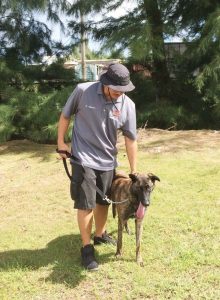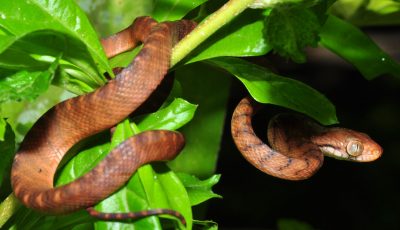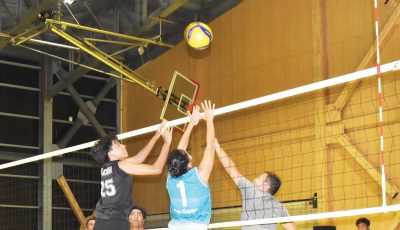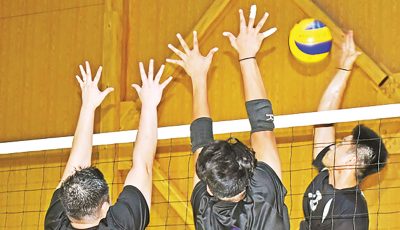Snake program obtains two new ‘sniffer’ dogs

Josh Lizama of the CNMI Brown Tree Snake program takes out a new canine for a walk around the office’s premises. (CONTRIBUTED PHOTO)
The Division of Fish and Wildlife and the CNMI Brown Tree Snake program recently welcomed two new detector canines from Oklahoma.
After a brief meeting with Animal Health and Quarantine, the dogs began their 120-day quarantine at the Division of Fish and Wildlife kennels in Lower Base.
The dogs, called Greta and Zing’r, took 60 hours to travel from Aachen Dutch Shepherds in Oklahoma to Saipan via Micronesia Air Cargo Services, with an overnight stop in both Hawaii and Guam.
“I believe they were just as excited to see us as we were to see them,” said acting Lands and Natural Resources secretary Augustin Kaipat.
Kaipat related that acquiring the dogs was a detailed process that required many hours from the DLNR staff within the BTS Program, as well as Division of Fish and Wildlife and partners.
“I extend a well-deserved thank you to everyone who assisted in the procurement of our two new canines here at the BTS program as well as funding provided by the Office of Insular Affairs,” he said.
He said that trainers and handlers will work closely with two dogs to assure their preparedness to join the brown tree snake team as the first line of defense against brown tree snakes in the Commonwealth.
“They’ve been settling in nicely and have shown inquisitive personalities and high drive, making them perfect for the team. We really thank Mr. Donmoyer in ensuring detector canine care and training,” said Kaipat.
Kevin Donmoyer is the BTS program coordinator.
The two dogs join two others with the BTS program: One working on Saipan and one on Rota.
The use of a detector canine is one of the best resources because of their acute sense of smell.
“The addition of these two dogs will allow the Tinian canine to be returned as soon as they complete their training. We need to continue to safeguard our islands from brown tree snakes and are taking these increased preventative measures. The BTS team is driven and motivated to ensure the Commonwealth stays snake-free,” Kaipat said.
Donmoyer added that to keep the BTS program completely functional, it is imperative that the dogs are kept healthy and happy, so daily care and cleaning is strictly enforced.
“All standard canine care activities occur including daily cleaning, food, water, and exercise. In terms of captive brown tree snake care to keep the scent of brown tree snakes fresh in the detector canine’s minds, captive brown tree snakes are housed at the BTS Program’s facility and are routinely used as a training tool. These snakes are also used in outreach events to better engage the public what a brown tree snake looks like,” Donmoyer said.
He noted that each captive snake is male and has been sterilized as well as implanted with a radio transmitter. In the event that the snake escapes, it cannot reproduce and can be tracked and located.
For more information on the brown tree snake program, call the Division of Fish and Wildlife at 664-6014. (PR)



























